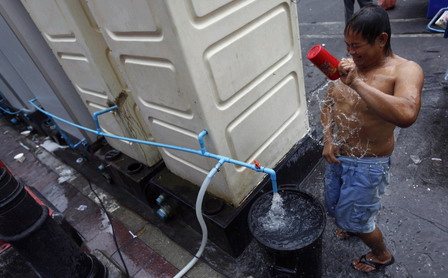Asia-Pacific
Water, electricity cuts to Bangkok protest zone
(Agencies)
Updated: 2010-05-12 19:26
 |
Large Medium Small |
|
|
BANGKOK - The Thai government turned to siege tactics Wednesday after fruitless efforts to compromise with protesters barricaded in central Bangkok, announcing that the army would limit supplies of water, food and electricity to the protest zone.
Army spokesman Col. Sansern Kaewkamnerd said security forces would "not use force at this stage," but his wording left open the possibility of more violence in Thailand's two-month political standoff if the Red Shirt protesters refuse to disperse.
| ||||
The measures include, cutting water, electricity and mobile phone signals to the protest zone and stopping bus, rail and boat services to the area, Sansern said, adding that authorities would also "seal off entrances to the area."
The announcement came a day after Prime Minister Abhisit Vejjajiva warned protesters who have paralyzed Bangkok's central business district to leave by Wednesday or face consequences that could also affect residents who live nearby.
Security forces may "implement measures that will have an impact on people in the area, not only the demonstrators but also workers and residents," Abhisit said.
The anti-government protests have crippled the capital's ritziest shopping district, forced the closure of several luxury hotels and devastated the economy, particularly the vital tourism sector. The protest zone spans about 1 square mile (3 square kilometers) and is bordered by upscale apartment high-rises and office buildings.
Chances of a negotiated settlement to the standoff appeared to be unraveling as the government toughened its tone and protesters vowed not to budge until their demands are met.
"Firstly, we are using our own electricity generators, so we are not dependent on the public power source," said a protest leader Jatuporn Prompan. "Secondly, if the government decides to cut water ... this will also effect half of the city. So, we do not care about the government's threat."
The mostly poor rural Thai protesters started their rally March 12 to demand that Abhisit call new elections, but they recently added a demand that his deputy face criminal charges for a deadly crackdown on their rallies.
"We will wait here. If we can't have justice, you can come take our lives away," said another protest leader Nattawut Saikua.
The Red Shirts include the rural and urban poor as well as pro-democracy advocates who see the Oxford-educated Abhisit as symbolic of an elite insensitive to the plight of most Thais. Many are supporters of former Prime Minister Thaksin Shinawatra, a populist leader who was accused of corruption and abuse of power and ousted in a 2006 military coup.
Government spokesman Panitan Wattanayagorn said late Tuesday that the prime minister had lost patience and was rescinding his compromise offer to hold early elections on Nov. 14 as part of a reconciliation plan.
"He said there will no longer be any more compromises or conditions," Panitan told The Associated Press late Tuesday. "Their refusal to stop the protest meant that the conditions that were set are being canceled, including the election date."
Several violent incidents related to the Red Shirt protest have killed 29 people and wounded more than 1,400, according to the Health Ministry.
Abhisit last week told the Red Shirts -- who view his government as illegitimate -- that he was willing to hold new polls in November, more than a year before the end of his government's term. That was presented as part of a reconciliation package on the condition that the demonstrators end their protest.
The Red Shirts, who have been pressing for quick elections, said they agreed in principle, but on Monday added a list of conditions of their own including that Abhisit and his top deputy surrender to police over an April 10 attempt by security forces to disperse protesters that left 25 people dead.
"If petty issues keep being brought up, it's not going to end, because the government isn't going to compromise," Abhisit told reporters late Tuesday, adding that people's patience with the demonstrators had frayed.
"What is essential right now is to return normalcy to society," he said, adding that it must be done quickly.











